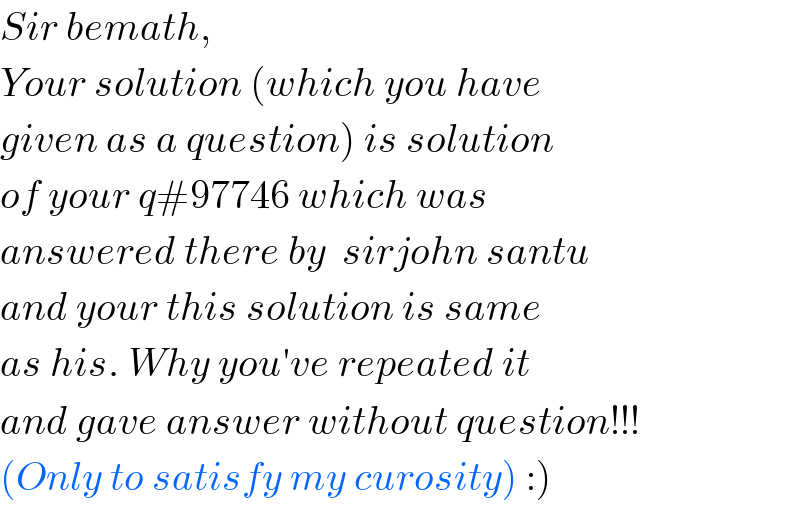Question Number 100951 by bemath last updated on 29/Jun/20

Commented by Rasheed.Sindhi last updated on 29/Jun/20

$${By}\:{john}\:{santu}\left({answer}\:{of}\right. \\ $$$$\left.{q}#\mathrm{97746}\right)\:{Same}\:{as}\:{above}. \\ $$$$\mathrm{2}^{{x}} \left(\mathrm{1}+\mathrm{2}^{{x}+\mathrm{1}} \right)\:=\:\left({y}−\mathrm{1}\right)\left({y}+\mathrm{1}\right) \\ $$$${show}\:{that}\:{the}\:{factors}\:{y}−\mathrm{1}\:{and}\:{y}+\mathrm{1} \\ $$$${are}\:{even},\:\mathrm{exactly}\:\mathrm{one}\:\mathrm{of}\:\mathrm{them}\: \\ $$$$\mathrm{divisible}\:\mathrm{by}\:\mathrm{4}.\:\mathrm{Hence}\:\mathrm{x}\geqslant\mathrm{3}\:\mathrm{and}\:\mathrm{one} \\ $$$$\mathrm{of}\:\mathrm{these}\:\mathrm{factors}\:\mathrm{is}\:\mathrm{divisible}\:\mathrm{by}\:\mathrm{2}^{\mathrm{x}−\mathrm{1}} \\ $$$$\mathrm{but}\:\mathrm{not}\:\mathrm{by}\:\mathrm{2}^{\mathrm{x}} .\:\mathrm{so}\:\mathrm{y}\:=\:\mathrm{2}^{\mathrm{x}−\mathrm{1}} \mathrm{m}+\epsilon\:,\:\mathrm{m}\:\mathrm{odd}\:,\:\epsilon\:=\:\pm\mathrm{1} \\ $$$$\mathrm{plugging}\:\mathrm{this}\:\mathrm{into}\:\mathrm{the}\:\mathrm{original}\: \\ $$$$\mathrm{equation}\:\mathrm{we}\:\mathrm{obtain}\:\mathrm{2}^{\mathrm{x}} \left(\mathrm{1}+\mathrm{2}^{\mathrm{x}+\mathrm{1}} \right)=\left(\mathrm{2}^{\mathrm{x}−\mathrm{1}} \mathrm{m}+\epsilon\right)^{\mathrm{2}} −\mathrm{1} \\ $$$$=\:\mathrm{2}^{\mathrm{2x}−\mathrm{2}} \mathrm{m}^{\mathrm{2}} +\mathrm{2}^{\mathrm{x}} \mathrm{m}\epsilon \\ $$$$\mathrm{or}\:\mathrm{equivalently}\:\mathrm{1}+\mathrm{2}^{\mathrm{x}+\mathrm{1}} =\mathrm{2}^{\mathrm{x}−\mathrm{2}} \mathrm{m}^{\mathrm{2}} +\mathrm{m}\epsilon \\ $$$$\Leftrightarrow\:\mathrm{thus}\:\mathrm{we}\:\mathrm{have}\:\mathrm{the}\:\mathrm{complete} \\ $$$$\mathrm{list}\:\mathrm{solutions}\:\left(\mathrm{x},\mathrm{y}\right)\::\:\left(\mathrm{0},\mathrm{2}\right),\left(\mathrm{0},−\mathrm{2}\right), \\ $$$$\left(\mathrm{4},\mathrm{23}\right),\left(\mathrm{4},−\mathrm{23}\right).\: \\ $$
Commented by Rasheed.Sindhi last updated on 30/Jun/20

$${Sir}\:{bemath}, \\ $$$${Your}\:{solution}\:\left({which}\:{you}\:{have}\right. \\ $$$$\left.{given}\:{as}\:{a}\:{question}\right)\:{is}\:{solution} \\ $$$${of}\:{your}\:{q}#\mathrm{97746}\:{which}\:{was} \\ $$$${answered}\:{there}\:{by}\:\:{sirjohn}\:{santu} \\ $$$${and}\:{your}\:{this}\:{solution}\:{is}\:{same} \\ $$$${as}\:{his}.\:{Why}\:{you}'{ve}\:{repeated}\:{it} \\ $$$${and}\:{gave}\:{answer}\:{without}\:{question}!!! \\ $$$$\left.\left({Only}\:{to}\:{satisfy}\:{my}\:{curosity}\right)\::\right) \\ $$
Commented by 1549442205 last updated on 01/Jul/20

$$\mathrm{I}\:\mathrm{guess}\:\mathrm{perhaps}\:\mathrm{he}\:\mathrm{want}\:\mathrm{everyone}\:\mathrm{know}\:\mathrm{above} \\ $$$$\mathrm{his}\:\mathrm{question}\:\mathrm{with}\:\mathrm{a}\:\:\mathrm{good}\:\mathrm{solution}\:\mathrm{for}\:\mathrm{it} \\ $$
Commented by Rasheed.Sindhi last updated on 01/Jul/20

$$\mathcal{M}{ay}\:{be}. \\ $$
